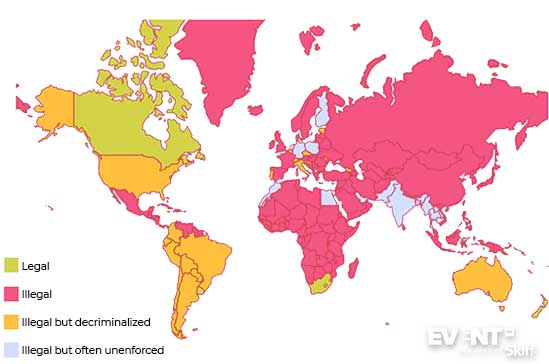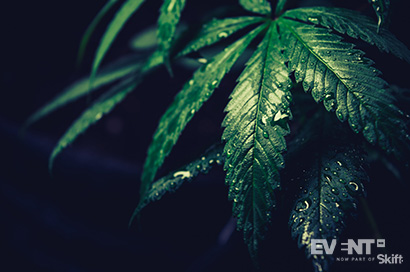Skift Take
The legalization of cannabis in Canada and many US states has created a mainstream potential for business events. However, there are still some limitations and pitfalls to be aware of when incorporating it into events. Here's what you need to know.
The new, trendy cannabis product recently taking much of the country by storm is CBD, or cannabidiol, which is derived from hemp. A reputation for a range of health and wellness benefits without the intoxication of marijuana has made it popular and widely available, but at least in the US, it still operates in a bit of a legal gray area.
The fact remains that cannabis remains a highly controlled substance, with cannabis-related actually increasing in the US in 2018.
Nevertheless, cannabis products – both CBD and the intoxicating chemical tetrahydrocannabinol (THC) – are undoubtedly becoming more accepted and available in a number of formats, and planners are beginning to incorporate them into their events.
If you’re thinking of including a cannabis-related activation at your event or will be attending an event that has cannabis available, here’s what you need to know.
The Lowdown on the Law
Cannabis has had a long legal and regulatory history in most countries throughout the world.
In the United States, it was first subject to federal regulation in the early 20th century but was accepted as a legitimate treatment for certain medical conditions when California became the first state to legalize medical use in 1996, and most other states have since followed suit.
Now, cannabis is legal for both medicinal and recreational use in many places, and for the purposes of this article, we are referring to its recreational use when discussing cannabis products and their legality.
WHERE’S IT LEGAL?
As of 2020, only four countries in the world have fully legalized the recreational use of cannabis: Uruguay – which was the first in 2013, South Africa, Georgia, and most recently, Canada. Contrary to popular belief, cannabis is not legal in the Netherlands, but its sale and use are tolerated, and the laws are not often enforced.
In addition, as we write this article in January 2020, cannabis is currently legal in 11 US states — Maine, Vermont, Massachusetts, Michigan, Illinois, Colorado, California, Nevada, Oregon, Washington, and Alaska — and Washington, D.C.
If you're organizing an event where attendees will be consuming or receiving cannabis in any form, make sure you're hosting in a location that has fully legalized its recreational use.
American cannabis law can be tricky because there are conflicting federal and state regulations — although several states have legalized cannabis, it still remains completely illegal at a federal level. While this is unlikely to affect individuals in possession of cannabis, it presents an interesting legal situation for dispensaries and growers. It is imperative that planners partnering with any cannabis suppliers for their events use a reputable, local organization.
It’s also important to note that certain states like California prohibit the consumption of cannabis at an event where alcohol is also being served.

HOW MUCH IS ALLOWED?
Where cannabis is legal, there are still regulations limiting how much an individual is permitted to carry. In accordance with Canada’s recent law, that amount is 30 grams (about 1 ounce). However, the permitted amount varies in the US depending on the state, but is never more than the state deems appropriate for personal use.
Always keep the legal carry limits in mind if you're planning to distribute cannabis to event attendees. If you’re offering cannabis as a giveaway, they will be subject to the the local regulations.
When it comes to drug regulations, which include those around cannabis use, it’s also important to understand the difference between full-on legalization and decriminalization. Certain countries, such as Portugal, and states, such as New York, have decriminalized but not legalized cannabis use.
This means that possession of small amounts no longer carries a criminal charge, though it may still be subject to fines. Possession of large amounts or selling cannabis, on the other hand, is still criminal. As with most other regulations in the US, the exact laws and permissible amounts depend on the state.
ARE THC AND CBD DIFFERENT UNDER THE LAW?
As many products contain both CBD and THC, it’s important to understand the difference. The fundamental difference is that THC is intoxicating, whereas CBD is not. Whether the law accounts for that difference depends on where you are.
We spoke with Shekhar Parmar, Founder and CEO of HighBar Enterprises, a company that creates and invests in cannabis projects in both the US and Canada.
Parmar began his career as a lawyer, then became an entrepreneur and started one of Canada’s leading medical clinics with a focus on medical marijuana. He is quick to emphasize that “CBD and THC are in the same classification in Canada in terms of how they’re scheduled,” unlike in the US, where purchasing CBD is legal as long as it doesn’t contain more than 0.3% TCH.
However, some states have restrictions on this substance. Selling CBD in health products, food, and supplements is technically illegal except if approved by the FDA, but it is not currently highly regulated.
Event activations may incorporate products containing THC, CBD, or a combination of both. As an organizer, it's important to understand the regulations governing the distribution, consumption and possession of both to ensure you don't run into any trouble.
Using Cannabis at your Events
At “bud bars,” where dispensary staff present and distribute cannabis products, education is a big focus. The organizations that tend to facilitate this type of activation aim to teach event attendees about cannabis, its benefits, and its proper use in an effort to help destigmatize the substance as well as build awareness about its medicinal benefits. While we’re still a long way from “bud bars” becoming the norm at events next to alcohol bars, many companies and event organizers are taking advantage.
Companies that specialize in cannabis have emerged to meet the growing demand for cannabis activations at events. They offer customized cannabis experiences and take care of the legal and regulatory side of things to ensure compliance with the current laws.
A great way to include cannabis in events without legal liability is to create a cannabis-themed experience that doesn’t necessarily involve consumption or sales. For example, in 2018, Outside Lands Music Festival produced a cannabis activation including non-infused edibles and plants that attendees could feel, smell, and learn about.
And at least in the US, events can also offer CBD activations free of risk. Some popular examples include CBD-infused food and beverages, massages with CBD lotions and oils, and sampling of other CBD products.
CONSIDERATIONS FOR PLANNERS
While CBD likely presents fewer issues because of its lack of intoxicating effect, cannabis products with higher doses of THC do present those risks. When hosting any event with a substance that causes impairment, be it alcohol or cannabis products with THC, organizers need to be mindful of their liability.
Parmar advises that commercial host liability is an issue whenever you’re serving anything intoxicating.
Planners should therefore be hyper-aware of how their activations may impair attendees and, according to Parmar, should follow the same best practices that apply to serving alcohol at an event. In other words, always check credentials, and make sure you’re hiring professionals who know how to give out appropriate amounts and will monitor the attendees’ levels of impairment.
It’s advisable to avoid an “open bar” situation where there is no limit to how much attendees can consume, especially when certain forms of cannabis such as edibles are involved. According to Parmar, the effects of inhaling cannabis come on much more quickly, which makes it a lot easier for most people to regulate their own doses.
“Edibles, on the other hand, are very, very tricky,” he warns.
Parmar also suggests offering taxi vouchers for those who may be too impaired to drive home safely and including non-impairing options to give attendees a choice of what to consume. It’s also a good idea to make sure there’s food available.
Planners should always be aware of what’s being served and at what dosage to be able to assess the situation. CBD alone shouldn’t cause impairment, for example, but products can have varying ratios of CBD to THC and affect people accordingly. If you notice that someone has crossed that threshold, it’s crucial to be proactive to ensure they are taken care of, and to be ready to call the police as a last resort if there’s any risk to people’s safety.
“As a nascent industry, we have a big responsibility to make sure we’re being really responsible in the way we allow and promote the use of cannabis,” says Parmar.
DON’T FORGET ABOUT POST-EVENT TRAVEL
Depending on an event’s location and target audience, attendees may be flying in, arriving by train, or simply driving themselves. If cannabis will be distributed at the event, both planners and attendees need to be aware of local limits both in terms of blood THC content. Over-education is the key here.
According to Parmar, most jurisdictions measure impairment based on the level of certain drugs in the blood, which isn’t always the best indication of how impaired someone is. THC in particular can stay in your system longer than the impairment lasts. Even if someone feels fine, and can function normally, they may still run into trouble if they are technically above the legal limit.
On traveling over any sort of border with cannabis, Parmar is very clear: don’t. “You cannot travel across borders, especially in Canada, with either CBD or THC,” he advises.
In terms of giveaways, planners therefore need to be extremely cognizant of where attendees are coming from and how far they’ll need to travel to get home. And even if cannabis is being distributed in an area where it’s legal, and attendees are traveling only within that area, it’s still important to keep legal possession limits in mind.
IN CONCLUSION
Although cannabis in its different forms has been getting more attention as of late, and regulations around it are becoming laxer in certain parts of the world, it’s important to remember above all that it’s still a controlled substance. Necessary precautions need to be taken when distributing, consuming and carrying it.
If you’re considering cannabis for your event, make sure you thoroughly research the legality in your area and consider consulting a lawyer if necessary to ensure you understand and will be fully compliant with the local regulations.






